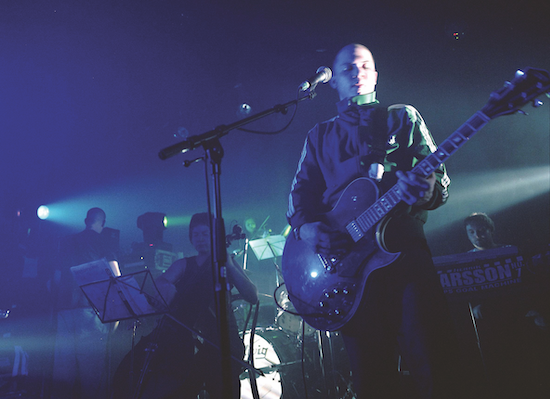Stuart Braithwaite (c) Tommy Ga-Ken Wan
I read Stuart Braithwaite’s Spaceships Over Glasgow with a certain amount of personal interest, in addition to the trepidation that came with being a long time respecter of Mogwai’s music. I grew up in Hamilton, the Lanarkshire town where much of the book is located in the chapters dealing with its author’s formative years, a place that subsequently hovers throughout the text in spirit. Braithwaite’s mum was our family GP and I distinctly remember her injecting my arm when I got my primary school jags. Scotland is a small place and yet what I think the book perhaps does best is show how the connections between people and place can lead to new, larger possibilities within and emanating from the country.
When discussing the book with a photographer-writer friend, I mentioned that Braithwaite wasn’t happy with how his band’s debut album Mogwai Young Team turned out. Yet we both agreed that it and Come on Die Young were probably still our favourites, with my friend saying that the former managed to sonically sum up Scotland as it perfectly captures the city/rural dichotomy and the expanses and pockets of space and dissonance.
I think at heart that is what the book also does. References to his family history and relationships, friendships and formation of values are at their most compelling when contextualised in place – whether that’s Lanarkshire, the Outer Hebrides, New York State or the Spain of the Civil War. This is further reinforced by learning how people and place came together in the cover art of Mogwai’s albums.
An underlying strength throughout the book is Braithwaite’s honesty about his own failings and sometimes suspect motivations, whether in personal or band relationships, interviews or simply acting like a drink-, drug- or ego-fuelled dick. When I asked him about why he wrote the book, he said that:
“A lot of the realisations I had were part of the process of writing the book as opposed to the reason for me writing it. Lee Brackstone [editor/publisher] had asked me if I was interested in writing a book quite a few years back and it was the sudden decimation of the live music world that led me to get in back with him to check that he hadn’t been joking. I do think that writing has helped a lot in me understanding how big a part my dad played in my life though.”

He also admitted that he was “definitely more nervous about reviews than I would be for a record”. With the sheer volume of music memoirs coming out in addition to older classics of the genre such as Julian Cope’s Head On and newer likely-to-become-so ones by Cosey Fanni Tutti, for example, I think that’s understandable. To his credit, Braithwaite also makes no claims to being a fully-formed debut writer, saying,
“I don’t think I’m a good enough writer to base the book on anyone else’s work, though I was conscious of things that I’d enjoyed about other people’s memoirs and kept that in mind to some degree. I didn’t want to be overly or unnecessarily serious and I don’t want to use it as a vehicle to play out any grudges. Other than that, I just got on with it and really thought about what I’d written after the fact”
I read a proof so it may be that the finished work differs a lot but I would say that this approach shows. I don’t, however, necessarily see that as a bad thing because to me the book is in some ways a document of learning. As he has clearly demonstrated for the last few decades, Braithwaite knows how to practice and make pretty much perfect at times.

The book for me is an honest answer to the question that I just assume all music fans have: how does someone from a small place in Lanarkshire end up touring the world and being able to make the kind of music that they want to make and have it be their life? That Braithwaite wrote the book partly because that life was being eroded by the pandemic and the fact that much of the response to Covid was predicated by structures of global capitalism is just as interesting as Mogwai “getting mortal” once again before, during, and after a gig. Being a touring musician is an identity that perhaps has no other true equivalent in the arts, and the impact on those who have made it their life through hard work – as well as hard partying – is important.
Talking about album reviews in the book, Braithwaite says that he wishes reviewers would review what they are hearing rather than what they want to hear, which I think is a legitimate point. That said, I think that there are many different ways to read a book – more so even than how mood, time, place, memory and circumstance affect listening to music. Spaceships Over Glasgow can be read in many ways. It’s very clear from it and other memoirs by musicians, writers and artists that the ability to live a creative life cannot happen without drive, the support of family or significant others whoever they may be, meeting the right people, friendships, access to equipment, a certain amount of luck, and – as Braithwaite exemplifies clearly – knowing when to say no to the wrong opportunities (such as turning down label offers).
You could read the book with the subtitle (the word ‘mayhem’ chosen by the publisher; ‘misspent youth’ by Braithwaite) as the guiding context but perhaps contrarily I found this the least interesting perspective. There are definitely some great anecdotes (particularly one involving a manhole cover) and some funny incidents that read like being in the pub with your pals the day after after a long night out. But for me, it’s the quieter bits where Braithwaite’s writing voice comes through.
There’s a long paragraph about a morning where he finds a sense of peace alone in a park in Japan, and this to me is the writer that he might become. His openness in recounting naïvety as well as wild nights are what kept my interest as well. Not knowing what cheesecake is, not having heard of Gladys Knight and then loving her, his love of skateboarding and its mental health benefits. It’s these wee moments that give us a truer sense of who someone is, which is surely the purpose of memoir.

The sense of family that is evident throughout – whether his own, the band itself, touring pals or recording with Mercury Rev’s Dave Fridmann – is what persists underneath any ‘mayhem’. I would also argue that a youth is not misspent when you have amassed the body of work that Mogwai has and this book, if anything, shows that what society tells kids is time wasted is often very much not. When offered the means to make use of time differently they can and often will do so positively.
More than anything though, Spaceships Over Glasgow was a wonderful opportunity to be in the place where the realities of people, time and space merge – an opportunity that I feel only music truly offers. The anticipation of a gig, the shared music and connections and memories, the fake ID, the journey to a venue, and then its specific layout and qualities. These are the common spaces, where artist, fan, merch seller, whatever, exist collectively in a kind of suspended time.
The points where music, films, video games and books intersect lead up to that moment and the earlier sections of the book particularly convey this really well. Again, I have to declare a personal bias and say that the bands mentioned are some of my all time favourites: Mercury Rev, Godspeed You! Black Emperor, My Bloody Valentine, Tortoise, Yo La Tengo, Stereolab, Labradford, Smog, Pavement, Broadcast, Pram. Reading it was like being returned to a different me that is still essentially the same but, like Braithwaite, a bit wiser. It is that transportation via the muscle memory of music – not nostalgia – that made reading this hugely enjoyable.
Braithwaite says of Sonic Youth that they “blurred the lines between rock and roll, poetry and art” and that “it felt like he had managed to meet the moment”. There were points in reading where I was truly in the moment of past gigs. This merging of realities is also reflected on the page, with Mogwai first supporting then headlining over their various heroes, such as Low. It’s this ability to change formation, with music remaining as the constant (much as with the friendships), that really comes across.
In Niall McCann’s film about a journey to a festival of Scottish indie music in Brittany, Lost in France, a gig and journey that Braithwaite documents in the book, he says it’s impossible to explain music and what it does to you, and I think that’s true. But sometimes that inexplicable feeling can be reactivated by someone else’s memories, much as Braithwaite himself found when writing it, saying, “One of the most fun parts of the whole thing was talking to old pals about things that had happened. Loads of the best stuff in the book was things I’d completely forgotten about until it came up from other people.”
Throughout the book Braithwaite recounts gigs he’s been to and songs he’s listened to, and I found it quite amusing that so many of them are held up by him to be akin to the “perfect” one. Yet also, on a very fundamental level, he is right. Music is an endless repetition of different perfect moments and this really brought that home for me.
Braithwaite told me, “I do enjoy writing but had no idea really if I would. It was totally new to me. It was a bit of a leap of faith deciding to do something I’d never done. I think music and literature are very different though there is definitely a bit of overlap in the people that are drawn to both. I don’t think it’ll be the last thing I write so it’s good to have found something new that I enjoy”
There are definite clues in Spaceships Over Glasgow as to what he might want to write had he perhaps had the confidence that (as with musicianship) comes with practice. This is where I feel that he will amplify a voice that is dryly and quietly there underneath the suggested mayhem. At various points in the book, he alludes to things like magic, aliens, the occult, BDSM, the kind of liminal spaces perhaps more commonly associated with psychogeography. I put it to him that these might be areas he could envisage writing about in more detail in the future.
“Absolutely,” he said. “I’m obsessed with the weird. I always have been. I think I’d love to write something Fortean or occult. I’d also love to write about some other musicians. I’m carrying around an unhealthy amount of information about loads of other bands. Might as well do something with it!”
I think, given Braithwaite’s previous history of how he spends time, something will be done with it.
Spaceships Over Glasgow: Mogwai, Mayhem & Misspent Youth by Stuart Braithwaite is published by White Rabbit Books. You can read an exclusive extract from the book on the Quietus today


